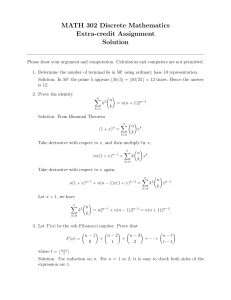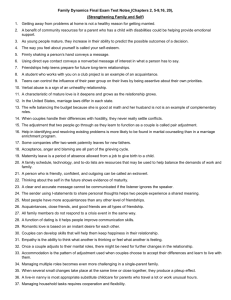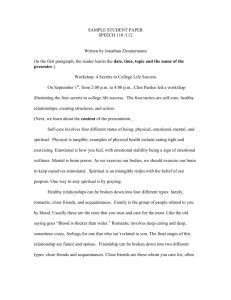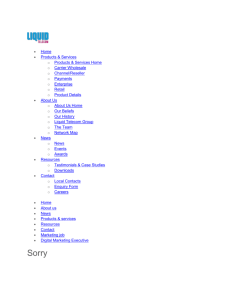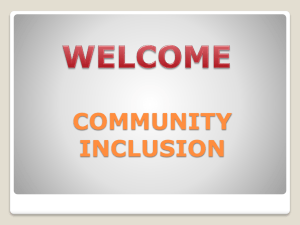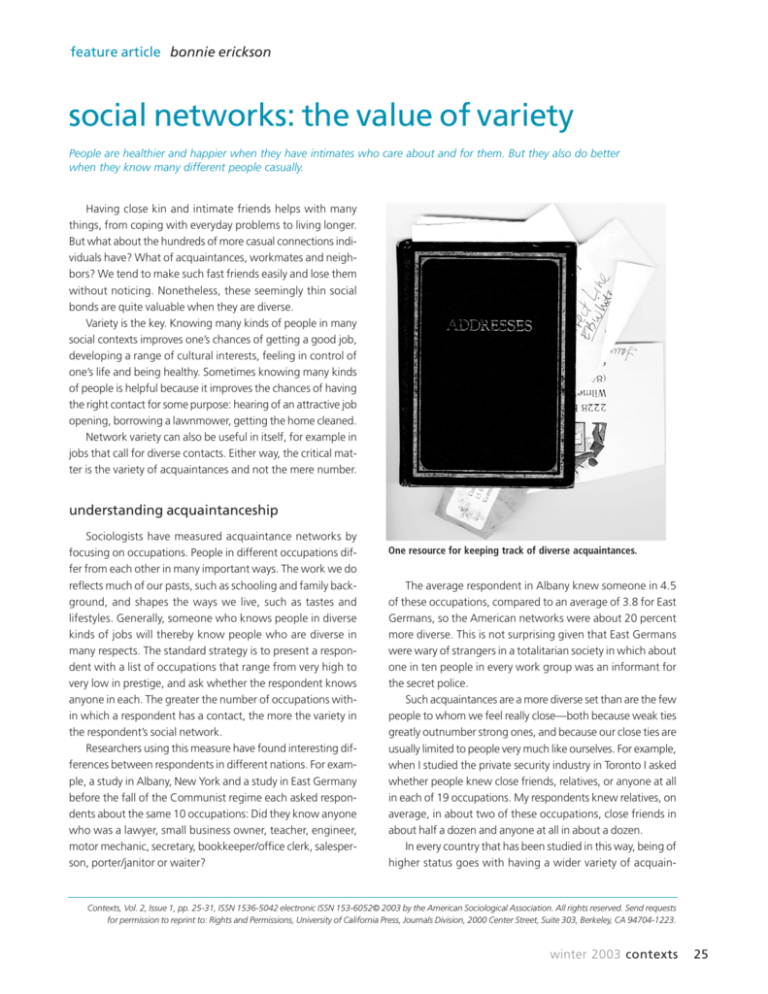
feature article bonnie erickson
social networks: the value of variety
People are healthier and happier when they have intimates who care about and for them. But they also do better
when they know many different people casually.
Having close kin and intimate friends helps with many
things, from coping with everyday problems to living longer.
But what about the hundreds of more casual connections individuals have? What of acquaintances, workmates and neighbors? We tend to make such fast friends easily and lose them
without noticing. Nonetheless, these seemingly thin social
bonds are quite valuable when they are diverse.
Variety is the key. Knowing many kinds of people in many
social contexts improves one’s chances of getting a good job,
developing a range of cultural interests, feeling in control of
one’s life and being healthy. Sometimes knowing many kinds
of people is helpful because it improves the chances of having
the right contact for some purpose: hearing of an attractive job
opening, borrowing a lawnmower, getting the home cleaned.
Network variety can also be useful in itself, for example in
jobs that call for diverse contacts. Either way, the critical matter is the variety of acquaintances and not the mere number.
understanding acquaintanceship
Sociologists have measured acquaintance networks by
focusing on occupations. People in different occupations differ from each other in many important ways. The work we do
reflects much of our pasts, such as schooling and family background, and shapes the ways we live, such as tastes and
lifestyles. Generally, someone who knows people in diverse
kinds of jobs will thereby know people who are diverse in
many respects. The standard strategy is to present a respondent with a list of occupations that range from very high to
very low in prestige, and ask whether the respondent knows
anyone in each. The greater the number of occupations within which a respondent has a contact, the more the variety in
the respondent’s social network.
Researchers using this measure have found interesting differences between respondents in different nations. For example, a study in Albany, New York and a study in East Germany
before the fall of the Communist regime each asked respondents about the same 10 occupations: Did they know anyone
who was a lawyer, small business owner, teacher, engineer,
motor mechanic, secretary, bookkeeper/office clerk, salesperson, porter/janitor or waiter?
One resource for keeping track of diverse acquaintances.
The average respondent in Albany knew someone in 4.5
of these occupations, compared to an average of 3.8 for East
Germans, so the American networks were about 20 percent
more diverse. This is not surprising given that East Germans
were wary of strangers in a totalitarian society in which about
one in ten people in every work group was an informant for
the secret police.
Such acquaintances are a more diverse set than are the few
people to whom we feel really close—both because weak ties
greatly outnumber strong ones, and because our close ties are
usually limited to people very much like ourselves. For example,
when I studied the private security industry in Toronto I asked
whether people knew close friends, relatives, or anyone at all
in each of 19 occupations. My respondents knew relatives, on
average, in about two of these occupations, close friends in
about half a dozen and anyone at all in about a dozen.
In every country that has been studied in this way, being of
higher status goes with having a wider variety of acquain-
Contexts, Vol. 2, Issue 1, pp. 25-31, ISSN 1536-5042 electronic ISSN 153-6052© 2003 by the American Sociological Association. All rights reserved. Send requests
for permission to reprint to: Rights and Permissions, University of California Press, Journals Division, 2000 Center Street, Suite 303, Berkeley, CA 94704-1223.
winter 2003 contexts
25
Job listing with preference for individuals who have lots of friends.
tances. In the Toronto security industry, business owners had
contacts in 15 occupations, managers in 13, supervisors 10,
and mere employees 9. In Hungary, before and even more so
after the end of Communism, wealthier people had more
diverse networks than the less wealthy. In Taiwan, more highly educated people have more diverse acquaintances than the
less educated, and men have more diverse acquaintances than
women do. In general, every kind of social advantage tends to
generate a network advantage, which in turn helps the socially advantaged to stay ahead.
they can do little for the candidate beyond what he or she can
do alone. But acquaintances are more varied, less like each
other, more likely to have new information and more likely to
include people highly-placed enough to influence hiring. Thus
family and close friends provide fewer jobs (and often worse
jobs) than do people outside the intimate circle. This is the surprising finding that Mark Granovetter called “the strength of
weak ties” (the title of one of the most frequently cited articles in social science).
Knowing many kinds of people in many social
networks and jobs
Diverse networks can help people to get good jobs. Having
a variety of acquaintances improves a jobseeker’s chances of
having one really useful contact, and variety itself is a qualification for some upper-end jobs.
People in North America find their jobs with the help of a
contact roughly half the time. We might assume that such
helpers must be close friends and relatives willing to work hard
for the jobhunter. But this is not the usual story in Western
nations. Close friends and kin want to help, but often cannot
do very much because they are too much alike: they move in
the same social circles and share information and influence, so
26
contexts winter 2003
contexts improves one’s chances of getting a
good job, developing a range of cultural
interests, feeling in control of one’s life and
being healthy.
The strength of strong ties applies best to the few people
at the top, because they have highly-placed kin and friends
who collect a lot of information and can exert a lot of influence. In general, more highly-placed people can connect a
jobseeker to more highly-placed jobs, and one big advantage
Diverse networks can help people to get good
jobs. Having a variety of acquaintances improves
a jobseeker’s chances of having one really useful
contact, and variety itself is a qualification for
some upper-end jobs.
of having a diverse network is the improved chance of knowing such a useful contact. The Albany study found that people
with more diversified acquaintances were more likely to get
help from contacts holding more prestigious jobs, which led
in turn to getting a job with higher prestige. On the other
hand, for most people, using a friend or relative as a contact
meant using someone with a lower-ranking job, and hence
getting a worse job. For the few who came from privileged
backgrounds, all kinds of helpers—friends, relatives or
acquaintances—were in high-status positions on average, and
all those kinds of contacts helped them get good jobs.
Having a diverse set of acquaintances matters where there
is a fairly free market in jobs and a fairly rich supply of jobs. If
jobs are scarce, those in the know will hoard access to good
ones for people they care about the most, so strong ties are
more valuable in these circumstances. In non-market systems
run by the state, the private use of personal contacts to get
jobs may be risky: networking subverts state power and policy, and influential people may not want to be responsible for
the occupational or political errors of acquaintances whom
they help. Well-placed people still provide personal help, but
mainly to jobseekers or intermediaries whom they know well
and can trust. Thus studies show that both the Chinese and
the East Germans (before the change of regime) used strong
ties the most, far more often than in the West.
Diversified acquaintances are valuable as an ensemble
when employers want to recruit both a person and the person’s contacts, to make his or her network work for the organization. This is especially true for higher-level jobs because it is
only higher-level jobs that include consequential responsibility for the “foreign affairs” of the organization. For example,
in my study of the private security industry in Toronto, I asked
employers how they hired for jobs from security guard up to
manager and asked whether the employer required “good
contacts” for these positions. For lower-level jobs, they did
not. But for upper-level jobs, employers often did want people with contacts they could use to monitor the industry and
its environment, to get information, to recruit new customers
and to maintain good relationships with powerful outsiders
such as the police.
Diverse acquaintance networks help individuals locate health services and assistance.
winter 2003 contexts
27
Photo by Linda Sanderson
Acquaintanceships developed at this urban dog park have led some members to new clients, services
and job prospects.
When employers think of good contacts, what do they
mean? In a word, variety. Employers named desirable contacts
of many kinds (in their own industry, government, the police,
senior management, etc.) and sometimes explicitly wanted
variety as such (“all available”). The more varied a person’s network, the more that network can do for the organization.
Employees with more network variety got jobs with
higher rank and higher income. This was true whether or
not people got those jobs through someone they knew.
Again, a network of acquaintances is more useful than one
of intimates, because acquaintances have the diversity
employers seek.
Does all this add up to “it’s not what you know, but who
you know?” Not really. Sometimes what you know is critical.
Even in the security industry, which has no formal certifications, employers often want to hire people with contacts and
skills, not contacts instead of skills. Because employers look for
both, using personal connections helps most to get a job at
the top or bottom of the ladder, not in the middle. At the bottom, skill requirements are modest. Employers just want a reliable employee and jobseekers just want an adequate job.
Using contacts is one cheap way to make this match.
At the top, skill requirements are important but also hard
to measure (how do you know whether someone will be a
dynamic manager with current knowledge of the market, for
example?) so employers look for prospects they know or can-
28
contexts winter 2003
didates recommended by people they trust. In the middle, skill
requirements are serious and fairly easy to measure through
credentials (like a recent computer programming degree from
a good school) or experience (like a strong track record in
sales), so who the candidate knows matters less.
Acquaintance diversity also contributes to being
better informed about health. People with
wider networks are better informed about most
things, but they may not realize how many of
their good health practices go back to a thousand tiny nudges from casual conversations.
networks and health
Knowing people is important in getting a job, but it also
matters for other areas of our lives that are less obvious, such
as good health. Research has long shown that having close
friends and family is good for a person’s health. People who
say they have someone they can count on feel less
depressed, get less physically ill and live longer than those
who do not. The newer news is that having a variety of
Most parents found this pediatric clinic through recommendations
by friends and acquaintances.
Photo by Mark Bosler
acquaintances also improves health. In a study of a Toronto
social movement, I asked people about both the diversity of
their contacts outside the group and the diversity of their
contacts within the group. I found that people with more
diversified general networks were less depressed, and people with more diverse contacts in the group more often felt
that participation had improved their health. Such findings
may seem odd, because our intimates play a more obvious
role in our health. We discuss our health concerns with those
we trust and get care from those who care about us.
Acquaintances make more subtle contributions in small,
invisible increments over the long run. One such contribution
is a sense of control over one’s life, a well-documented source
of good health. People who feel more in control are less
depressed just because of that, since feeling pushed around is
a miserable and unwelcome experience. Moreover, having a
sense of control encourages people to tackle problems they
encounter, so they cope better with stress. This valuable sense
of control grows with the diversity of acquaintances.
People with diverse contacts consciously adapt to different
situations and manage conflicting obligations. They have to
decide whom to see, how to act appropriately with others differing in their expectations, how to balance sometimes conflicting demands. As they navigate their intricate options, they
develop a well-grounded sense of control over their lives. Thus
I found that members with more diversified acquaintances
outside the Toronto movement felt more in control of their
lives overall, and members with more diversified acquaintances within the group more often felt that participation had
empowered them.
Acquaintance diversity also contributes to being better
informed about health. People with wider networks are better
“English club” members in Davis, California discuss books, cultural events, work and internship opportunities.
winter 2003 contexts
29
30
contexts winter 2003
Photo by April Gafni
informed about most things, but they may
not realize how many of their good health
practices go back to a thousand tiny nudges
from casual conversations. They may know
that they are committed to pushing down
the broccoli and getting some exercise,
while forgetting how many acquaintances
mentioned the importance of such healthy
habits. My study of the security industry
shows a clear link between diversity and
information flow, not only about health,
but on a variety of topics. People with more
A craft center class generates diverse acquaintanceships.
varied connections knew more about each
of several different kinds of things: the arts
(books and artists), popular culture (sports stars), and business culbecause political research has focused exclusively on close relature (business magazines and restaurants suited to power dining).
tionships such as the handful of people with whom a person
Feeling in control and being well-informed both flow from
discusses important matters.
the diversity of the whole ensemble of acquaintances. But
Another critical avenue for future work is the way in
health, like work, sometimes benefits from a varied network
which we think about and measure network diversity. At
because varied connections are more likely to include particupresent, almost all studies focus on the variety of occupalar useful ones. For example, people who knew many kinds of
tions within which a respondent knows someone. This works
people in the social movement group were much more likely
very well, because occupation goes with so many important
to get some help with health (from organic vegetables to masdifferences of resources, views, lifestyles and so on. But
sage) from associates in the group. They knew what to look
occupation is not the only way in which the social world is
for and whom to trust to provide it.
carved up into different kinds of people—gender and ethDiverse networks also improve people’s health indirectly,
nicity also shape networks.
by helping them get ahead economically, and wealthier peoFor instance, men occupy more powerful positions in
ple tend to be healthier people. But the connection between
organizations, so knowing a variety of men may help one’s
wealth and health might suggest that all these benefits of
job search more than knowing a wide variety of women. But
having a variety of acquaintances might really just reflect the
women take more responsibility for health, including the
advantages of high social position. People with more network
health of others, so knowing a good range of women may
variety, better jobs, more feelings of control and better health
be better for one’s health than knowing many kinds of men.
may be that way because they come from more privileged cirIn countries like the United States or Canada, ethnic groups
cumstances. It is important to note, therefore, that all the
have distinctive cultures and, sometimes, even labor marstudies that I have described have taken into account other
kets. Knowing a variety of people in an ethnic group may
characteristics of individuals, such as educational attainment
lead to better jobs within the ethnic economy, to richer
and gender. Nonetheless, the diversity of acquaintanceship
knowledge of the ethnic culture, to better access to alternaitself improves health and happiness.
tive medicines and to feeling better about the group. At the
same time, having acquaintances exclusively in an ethnic
group may cut one off from broader social benefits.
what next?
Indeed, there are many kinds of network variety: variety
of occupation, gender, ethnicity and much more. Each probOther possible benefits of network variety are yet to be
ably goes with a somewhat different menu of benefits. Future
studied. Students of politics have speculated that interacting
research should elaborate on the finding that, not only is
with a range of people expands one’s sources of political inforknowing people good for you, but knowing many different
mation and activity, and increases tolerance for others differkinds of people is especially good for you. ■
ent from oneself—but this is only speculation at present
Acquaintances among commuters who board at this train stop have helped them find music instructors,
back care specialists, legal services, teaching jobs, publishers, child therapists, bicycle repair shops,
travel agents, house painters, computer software, elder care facilities and clerical services.
recommended resources
Coser, Rose Laub. “The Complexity of Roles as a Seedbed of Individual
Autonomy.” Pp. 237-62 in Louis A. Coser (ed.), The Idea of Social
Structure: Papers in Honor of Robert K. Merton. New York: Harcourt
Brace Jovanovich, 1975. Explains why acquaintance variety should
lead to a greater sense of control over one’s life and to more sophisticated language and more abstract thinking as well.
Erickson, Bonnie H. “Culture, Class, and Connections.” American
Journal of Sociology 102 (1996): 217-51. Shows that knowing many
kinds of people goes with knowing a lot about many kinds of culture—
and how knowing about culture matters at work.
Fischer, Claude S. To Dwell Among Friends. Berkeley: University of
California Press, 1982. Strong ties matter too. This book describes
their benefits and the kinds of people who benefit more or less.
Lin, Nan. “Social Networks and Status Attainment.” Annual Review
of Sociology 25 (1999): 467-87. Authoritative review of research on
networks and getting a job. It includes references to the Albany, East
Germany, and China studies discussed in this article.
Lin, Nan, Karen Cook, and Ronald S. Burt (eds.). Social Capital: Theory
and Research. New York: Aldine de Gruyter, 2001. Includes a number
of recent, high quality theoretical discussions and research reports
concerning the benefits of social networks, including a chapter on the
Toronto security industry study.
Wellman, Barry (ed.). Networks in the Global Village. Boulder,
Colorado: Westview, 1999. A wide-ranging collection of studies on
strong ties and weak ties, around the world and on the Internet.
Granovetter, Mark. “The Strength of Weak Ties.” American Journal
of Sociology 78 (1973): 1360-80. Enormously influential, this essay
concerns the advantages of acquaintances both for individuals and
for communities.
winter 2003 contexts
31

